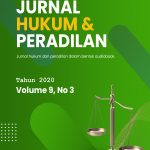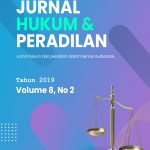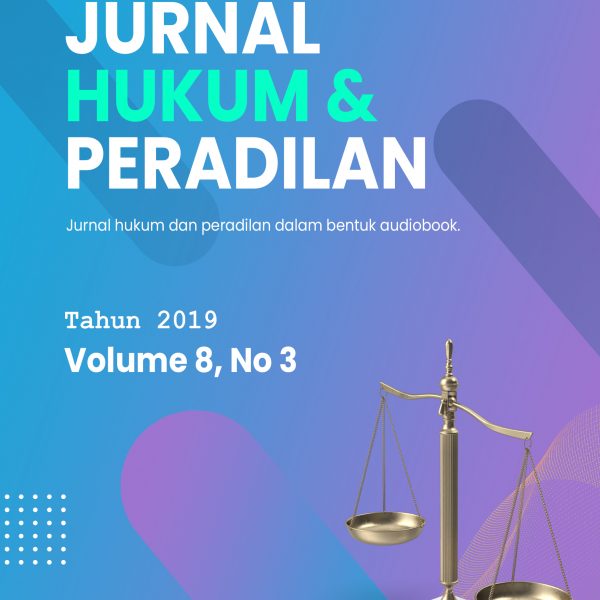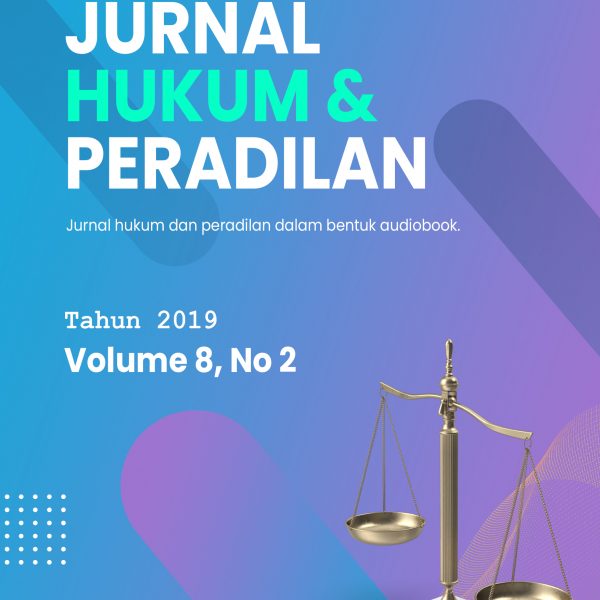
Jurnal Tahun 2019
Volume 8, No 1
1. The Quo Vadis Of Banckrupty Settlement And Pkpu Laws On Sharia Banking
Abstract.
Normatively, based on the decision of the Constitutional Court No. 93/PUU/X/2012 the settlement of Islamic economic disputes becomes the absolute competence of the Religious Courts. However, at the empirical level, there are still sharia economic disputes which are still decided by the Commercial Court (general), namely bankruptcy cases and PKPU on the sharia bank. This paper focuses on three things, first, what causes these cases to remain under the authority of the Commercial Court, secondly, what are the legal consequences if the case is resolved through the Commercial Court and how the legal arguments about the competence of the Religious Courts in bankruptcy cases and PKPU on sharia bank. This research method is normative law by examining a set of legal materials related to bankruptcy and PKPU. The analysis used is synchronization of the norms of Law No. 37 of 2008 and PERMA No. 2 of 2008. The results of the study found that the cause of the case is still handled by the Commercial Court because of a conflict of norms between the Bankruptcy Act and PERMA regarding KHES which still has not been finalized, the conditions legal vacuum regarding bankruptcy based on the sharia contract and the existence of the KMA letter regarding the instruction for the implementation of book II. Legal consequences if the case is dealt with by the Pengadian Niaga there will be coercion on the substance of sharia economic law into conventional economic law, not in sync between the settlement of the dispute with the contract and the concept of solving the case prioritizing business principles and business competition rather than substantive justice. Based on the theory of authority and the principle of the lex specialist, it was found the conclusion that bankruptcy cases and PKPU based on the absolute sharia contract became the absolute competence of the Religious Courts.
2. Implementation Of Judicial Activism In Judge’s Decision
Abstract.
The task of the judge in realizing justice is inseparable from the decisions that are made. A qualified judge’s decision is obtained through the judge’s thought process through a choice of judges that reflects judicial activism. The problem in this research is how judicial activism is used by judges in issuing decisions and how the implementation of judicial activism in decision making. Judicial Activism is the choice of decision making by judges in order to realize justice. Judicial activism in the Indonesian judicial system is regulated in Article 5 paragraph (1) of Law Number 48 of 2009 concerning Judicial Power. The law requires judges to explore the law and sense of justice that lives in society. The implementation of judicial activism is carried out by judges through means of legal discovery. Through means of legal discovery, judges play an active role in realizing justice as a law that lives in a dynamically developing society.
3. Creating A Standardized Assessment For Court Accreditation
Abstract.
The improvement of court’s quality has been done through various efforts, one of them is an accreditation program. Before the implementation of internal accreditation policies, the courts under the Supreme Court had used ISO standards to maintain the service quality. Along with the development of judiciary innovations especially the dream toward the great judiciary, the Supreme Court has developed special accreditation standards for each judicial environment. General Court (Badilum) has implemented the Quality Assurance Accreditation (APM) programme in 7 assessment areas. Afterward, the Religious Courts (Badilag) in addition to 7 APM areas as in Badilum also applied 9 other assessment standards. Furthermore, the Military and Administration Agency (Badilmiltun) has 7 different accreditation assessment areas with Badilum and Badilag. The problem that will be examined is how to determine the ideal criteria for assessing court accreditation. Given that the ideal accreditation standard is not only improving the quality of court services but also being able to meet the needs and expectations of justice seekers, as indicated by the community satisfaction index. The court accreditation standard used today is the adoption of the International Framework of Court excellent (IFCE) and is adapted to the area of Bureaucratic Reform and the oversight function of the Supreme Court. The method of determining accreditation criteria is done by comparing court accreditation standards that have been used with the SERVQUAL model. The SERVQUAL model is an initial model that appears to measure service quality. The results of the study found that a number of court accreditation assessment standards has been represented the dimensions of service quality at SERVQUAL.
4. The Suitability Of Sharia Life Insurance Policy For Pojk No. 69/Pojk.05/2016 And Pojk No. 72/Pojk.05/2016
Abstract.
The increasing of sharia insurance companies have sprung up in Indonesia. However, in their policy contracts there are still some parts that are not in accordance with sharia principles. This mismatch can cause information distortion that can harm customers or sharia insurance participants. The Sharia Insurance Policy as a form of written contract between the insurance company and the customer or the insurance participant should duly follow sharia principles in order to avoid the elements that forbid it, therefore in Indonesia the policy making must follow the legislation, namely Financial Services Authority Regulation No.69 / POJK.05 / 2016 (hereinafter abbreviated as POJK No.69 / POJK.05 / 2016) and the Financial Services Authority Regulation No.72 / POJK.05 / 2016 (hereinafter abbreviated as POJK No.72 / POJK.05 / 2016) as the basis of the rule legislation describing the standardization of sharia policy contracts. This study uses qualitative methods, the data used in the form of primary, secondary, and non-legal materials. The technique used is in the form of content analysis with the theme of normative juridical research that analyzes legal principles and systematics, and how much the level of synchronization of ABC Islamic sharia insurance products at PT. XYZ against POJK No.69 / POJK.05 / 2016 and POJK No.72 / POJK.05 / 2016. The results of this study concluded that generally the ABC Islamic Sharia insurance policy PT. XYZ is in accordance with POJK No.69 / POJK.05 / 2016 and POJK No.72 / POJK.05 / 2016, but there are some peculiarities in this policy so that it still needs to be questioned about the welfare side.
5. The Problems Of Court Services Types And Tariff Based On Government Regulation Number 53 Of 2008
Abstract.
The administration of judiciary is a form of state obligation as the fulfillment of civil rights for citizens. Various efforts in improving the quality of court services is continue to be encouraged through a modern judiciary with the development of information system technology, a necessity in the era of globalization. In addition, there is a paradigm shift in public services from traditional model to modern, efficient, effective and transparent public service. This was marked by changes in the form of services from manual performance models to information system automation and digitalization. The general practice of fulfilling public demands for government services continues to evolve rapidly following a series of measures (optimal), while the ability and capacity of service providers in meeting the demands of services of the developing community are slower follows the calculation series. As a result, there is a gap that requires continuous improvement through service innovation that requires sufficient funding. At present, the main government funding sources from the taxation sector are no longer able to cover all state expenditures. The trend of state income from the two sectors of state revenue, namely the tax and non-tax sectors in the last five years shows that the income from the tax sector continues to increase, while the Non-Tax State Revenue (PNBP) sector is relatively declining. Moreover, the provision of public services is endeavored to be free of charge. In judicial services, optimization of PNBP is based on the principle of administering justice (simple, fast and low cost) which has been regulated through Government Regulation Number 53 of 2008. The instructions for implementing government regulations have not been able to fully accommodate the activities and activities of case services, resulting in internal policies letter of the Secretary of the Republic of Indonesia No.268/SEK/01/V/2010 Regarding Time Remaining Cases and Case Fee Giro Services. Thus, it will be examined whether the demand deposit services and the remaining down-payment cases are the performance of the judiciary and whether it is possible for the Ministries/Institutions to self-determine through internal policies on the types of charges and non-PNBP tariffs set by PP No. 53 of 2008.
6. Intellectual Property Rights (Ipr) Aspect In The Franchise Business Format
Abstract.
In the franchise business, there are several aspects of IPR involved in it, such as trademark, copyright, patent either ordinary or simple, industrial design, and trade secrets. Each field of IPR has its own character and forms of legal protection that differ from one another, while the most basic aspects of IPR in the world of the franchise business, name brands and trade secrets. This study aims to analyze the correlation between aspects of Intellectual Property Rights and the franchise business format and which aspects of the IPR correlate with the format of the franchise business. The results show that the franchise agreement can be categorized as a principal agreement, involving the government, and the parties, while additional agreements, which are purely an agreement between the franchisor and the franchise, can be in the form of an agreement to maintain company secrets.
7. Advocate Immunity: Quo Vadis Of Value And Ethics In Legal Norms?
Abstract.
If the value in the ethics of a particular profession is attributed to the property of that particular profession, then the judgment of a ‘good faith’ offense can only be traced through a mutual consensus agreed upon by those in the profession. However, in this case, the Researcher is not in a position to say an Advocate can not be convicted. The researcher is more respectful of the value that should be heard and raised surface on the hegemony of legal norms.
8. State-Owned Enterprises And Economic Constitutions: A Case Study Of Judicial Review Of Law No.19 Of 2003
Abstract.
The purpose of this study seeks to uncover the meaning of Law No. 19 of 2003 and Article 33 of the 1945 Constitution of the Republic of Indonesia, and identify the essence of the roles and functions of SOEs in implementing the economic constitution. The study of SOEs in the realm of constitutional economics is seen as very important as a reflection of the rapid change in national and global economic development. The findings of the study lead to the philosophical understanding of economic constitution for the Republic of Indonesia by the role of state companies in national economic development. The theoretical description of the results of this study contributes to the knowledge of political economy and political democracy. The benefits practically have implications for the practice of public management about the governance of state enterprises, as well as corporate management for SOEs or other state-owned companies.
Audiobook Jurnal
1. The Quo Vadis Of Banckrupty Settlement And Pkpu Laws On ...
2. Implementation Of Judicial Activism In Judge’s Decision
3. Creating A Standardized Assessment For Court Accreditation
4. The Suitability Of Sharia Life Insurance Policy For Pojk ...
5. The Problems Of Court Services Types And Tariff Based on ...
6. Intellectual Property Rights (Ipr) Aspect In The Franchise ...
7. Advocate Immunity: Quo Vadis Of Value And Ethics In Legal ..
. State-Owned Enterprises And Economic Constitutions:






